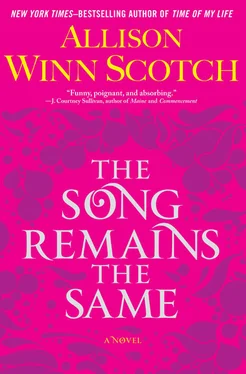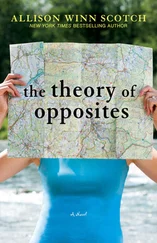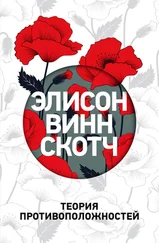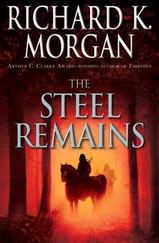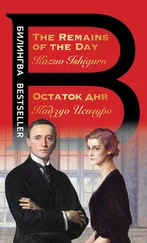Tonight, for my couch’s housewarming party, Anderson shows up with an orchid, my mother and Tate arrive with brownies, Rory totes in three overflowing bags from her favorite Vietnamese restaurant, and Jamie comes strictly with sweaty palms.
Rory pops open the take-out containers, spreading them on the pass-through counter, and the apartment is filled with the tinkling of plates, the uncorking of wine bottles, the spread of conversation. Peter turns the TV on mute as we wait for the nine o’clock hour to draw near, and as I sink into my new lipstick-hued couch, I’m struck with the sense that despite everything, I’m almost sort of lucky. That maybe it’s what my mother has opined: that if I didn’t know better, I’m happy. Maybe this is living in the moment, the absorbing of the smaller joys that can then snowball into bigger ones. Because I am feeling grateful: For Jamie, who is helping me weave the mystery of my life back together. For my sister, who feels like my trusted ally, even if we weren’t always so. For Anderson, who has his own set of issues to be sure—his inability to be alone, too much Hollywood speak, his love of all things alcoholic, but who isn’t letting that detract from his loyalty toward my own set of issues. And even for Peter, who has proven he’s willing to take whatever leaps I ask of him, even if I shouldn’t have had to ask for those leaps in the first place. Even, god help me, for my mother and Tate, both of whom instinctively irritate me like sandpaper, but since I am learning to rewire those instincts— choose it, control it! —even, yes, for them.
Although Anderson has opted out of the segment, Jamie has found a way to weave him back in. He’s there, in the background story, and I glance over to him, wondering if he’s annoyed, but he catches my eye and bounces his shoulders, an acknowledgment that maybe we’re in each other’s background stories for life now, and that’s that. They highlight various scenes from his movies, most of which I haven’t seen, a few of which are vaguely familiar in a generic sort of way.
“Oh my god,” Rory laughs, and it’s good to hear her laugh. “I didn’t realize you were in Battleship Wars !”
“It’s a high point on my résumé,” he shoots back, smiling.
“But Spielberg is calling now,” I say.
As if on cue, the phone starts ringing, and Anderson catches my eye and winks.
“That must be him.”
“Just leave it,” I say to Peter, who has moved to pick it up. “Whoever it is, we can call back when this is over.” The phone still rings often these days, even six weeks since I’ve been home—the media, the reporters—mostly at the gallery, but still, from time to time here, too.
Just before the commercial, Jamie reemerges on-screen, teasing my upcoming segment, his face stoic, his voice infused with just the right intonation of gravitas that the situation calls for.
“You’re going to be a star someday,” I say to him.
“You think?” he says, though I can tell he’s pleased, like the thought itself is the greatest thing he can dream of.
The phone is now a constant bleat in the background: buzzing steadily at patterned intervals. I hear the machine click on and on and on—a few journalists calling for personal quotes, but mostly friends emerging from my past to wish me well. Jamie is fielding his texts, as are both Anderson and Peter, and I realize that though my life is anonymous to my own brain, I’ve never been more of an open book: the world is out there, gazing in, begging to sift through my open pores and see my guts.
A laundry detergent commercial wraps up the advertisements, and Peter pipes up to say, “Oh, my office wrote that one. Not bad, right?” He hums the melody, and my mom and Tate bob their heads in approval. Rory shoots me a look as if she has sucked on a rotten lime, and I know what she’s thinking— Ginger —even though I am doing my best not to think of it. Because it is over, and your brain can tuck even the most serious of transgressions away if it wants to. I give her a look in return— just shut up! Let it go! And she rolls her eyes and does.
And then, the show is back and there I am. The makeup artist has bathed me in blush and dark eyeliner, and for a beat I don’t recognize myself. Then I squint and shift closer and yes, there I am. Me. Different. Tweaked. Sexier? Yes, maybe sexier. Like if I actually want to pull off this new fabulous me, with my weight loss and my defined cheekbones and now perfectly tweezed eyebrows, I might just be a knockout, a title usually reserved for Rory. Peter’s jaw unhinges and he glances toward me and winks.
“Gorgeous!” he says, totally oblivious to the undercurrent— Ginger!— that pulsed between Rory and me just seconds before.
“Every once in a while, miracles do happen,” I say.
“You really do look good,” Anderson says, and everyone murmurs their approval.
“Survive a plane crash, get a makeover. Seems like a fair trade,” I say.
Jamie and I chat about the usual things: what I remember (a short segment), what I don’t, what life has been like upon return. I share the few memories I’ve had—describing the house in Virginia and that summer evening in such acute detail that even my family sits rapt, my mother pushing the tears from her cheeks, Tate massaging her neck. I talk about the pregnancy, what I lost, though I don’t share the great unknown question— What was I going to do? —and I try to watch Peter without letting him know that I’m watching, to see what he’s thinking, how he reacts, what that might have meant for the future, as it was back then. Through it all, I don’t cry, though I feared that I would. I speak strongly and valiantly, and toward the end, when Jamie asks, “So why do you think you survived?” I offer a shrug of my shoulders, a limp shaking of my head, and have no answers. Only that I am choosing to move forward each day, that I am trying to make this second chance worthwhile. That’s all I can do, I tell him, and I hope that Liv is watching because I think she’d think my answer was the right one.
The phone is ringing and ringing, and Jamie goes to the tape, as images of my childhood—photos from junior high and tennis matches and that honeymoon in the Caribbean—are blended together as a montage of my life.
Finally, Peter throws an arm toward the cordless and says, “Can we please get that now? It’s giving me a headache.”
I push myself up from the couch and grab the phone from the base in the kitchen. The machine has twelve messages. I click the off button and rub my temples.
“Hello?” I say into the receiver.
“Nell?” says the voice. “I’m sorry to disturb you. It’s Jasper. Jasper Aarons. We met at your gallery. I’m the old friend of your father’s.”
“Oh yes, of course,” I say, already regretting answering. Yes, I know that you’re sorry for my losses and you’re thrilled that I’m making a recovery! All of these messages, the reporters aside, will echo much the same sentiments.
“Well, I just saw your American Profiles segment”—he clears his throat—“and I have something that I think you should see. I’d forgotten about it, to be honest, until tonight.”
“What? A map to my dad’s whereabouts?” I ask, trying to be funny but failing on every level.
“Not exactly,” he answers. “Look, I’ll take the train into the city tomorrow. Meet me for coffee. I’ll explain then.”
J asper Aarons meets me at a nondescript Starbucks two blocks from our building the next morning at ten. Peter has gone in to work, and as I shuffle down the sidewalk, my ribs still occasionally sore, it occurs to me that this is the first time I’ve gone anywhere on my own since I’ve been home. Like I’m a child who still needs a babysitter, a dog who needs its owner to be walked.
Читать дальше
